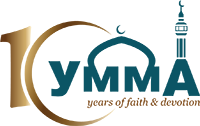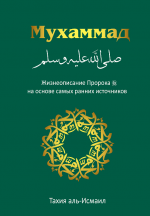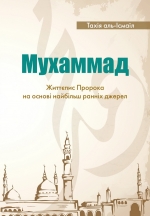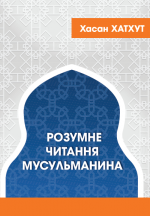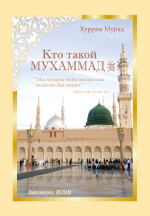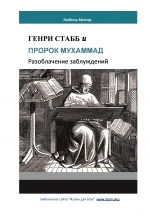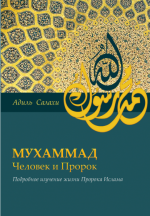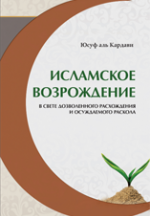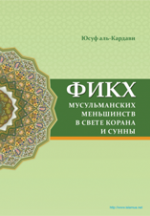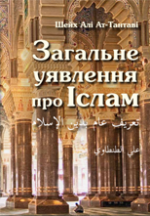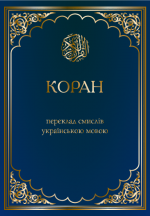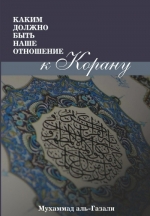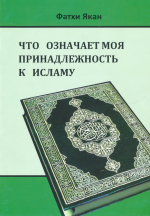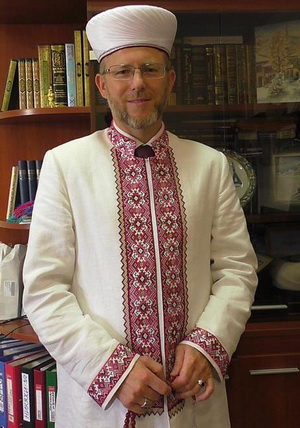
Mufti of RAMU “Umma”
Sheikh Said Ismagilov (Sergii Ismagilov)
One of Ukraine's Muslim leaders (Mufti of RAMU “Umma”) and one of Korrespondent’s top-100 influential Ukrainians. President of All-Ukrainian Social Organisation “Ukrainian Centre of Islamic Studies”, Ukrainian Islamic studies researcher, member of Donetsk Branch of the Ukrainian Religious Studies Scholars, Board member of Donetsk Region Council of Churches and Religious Organisations, lecturer of theology and religious studies at Ukrainian Islamic university (2001-2002), famous public figure. Elected Head of All-Ukrainian Council of Religious Organisations for 2018.
Family:
Born in Donetsk on 9 August 1978 to Tatar parents (father was a Kazan Tatar, while his mother was a Penza Tatar). Married; has a son.
Education:
1993–1997 — Donetsk Polytechnic College (Faculty of Engineering Mechanics);
1997–2001 — Faculty of Theology at Moscow Higher Religious Islamic College (now Moscow Islamic University). Graduated with honours degree and the titles of Imam and Preacher.
2002 — 2007 — Faculty of Philosophy of Donetsk State University of Informatics and Artificial Intellect. Bachelor of Philosophy and Master of Religious Studies.
Professional and Scientific Work:
2001–2002 — Associate Professor at Ukrainian Islamic University (Donetsk).
2002–2009 — Imam of Donetsk Muslim community “Duslık”.
25 January 2009 — elected as Mufti of the Religious Administration of Muslims of Ukraine “Umma”.
Sheikh Said Ismagilov is a follower of Sunni Islam and protagonist of the idea of al-wasatiyyah (moderation, golden mean) renouncing radicalism and extremities.
Sicne 2009 — Permanent member of the Council of Religious Administration of Muslims of Ukraine.
Since 2011 — was a member of a working party of researchers working upon a canonical translation of the meanings of the holy Qur’an to Ukrainian. The first edition was published in 2013.
2018 — coauthored with Mykhailo Yakbovych, issues the first-ever Ukrainian Textbook on “Islamic Studies”.
Languages: Ukrainian, Russian, Tatar, Arabic.
On his mission:
“On the Dawn of RAMU “Umma”, my goal as Mufti was creating Ukrainian Muslim Ummah. During that period, most Ukrainian Muslims didn’t identify themselves with Ukraine, and most religious researchers used “Muslims IN Ukraine”, not “Muslims OF Ukraine”. This concept wasn’t widely accepted and understood, and the phenomenon of Ukrainian Muslims was somehow amorphous.
It took focused preaching, hard work and educating people so that they started feeling themselves as Ukrainian Muslims. This is where history helped us, mostly the history of Crimean Tatars, whom we also involved in the process. There was a matter of tradition, and we had no better means of showing that islam was an integral part of Ukraine then Crimean Tatars, for other Muslim ethnicities were relatively new in Ukraine, with their history here dating back for only 100, 200 or 300 years.
Of course we thrive on ethnic Ukrainians who chose Islam as their religion, and promote their preservation of their ethnic identity, but as Ukrainians of Muslim faith. It is important that they pass it down to their children.”
On the Revolution of Dignity:
“I loved in Donetsk at that time, so I came to Maidan in Kyiv only twice. First, in December 2013, where I was invited to give a lecture at Mystetskyi Barbakan, and second, on the day of fusillading of the Heavenly hundred (20 February 2014). As for the rest of the time, I took part in Donetsk Maidan, and after the murders of local Maidan activists bega nin March 2014, I joined (along people of other religions) the Prayer Marathon on the Konsytutsiyi Sqr, which lasted until late August. In September I was informed that I had been on the local NKVD (secret police) list, and I managed to leave my home just a day before they came to arrest me.”
On Ukrainian Muslims Charter and Ukrainian Muslims Social Conception:
“Our loyalties have always been clear. First we signed Ukrainian Muslima Charter, and later Ukrainian Muslims Social Conception. Those documents, unfortunately, didn’t get their due share of attention from the researchers, and that's a misfire from the researchers. The point is that those documents declare Ukrainian Muslim community specifically as the integral part of Ukraine, that Muslims see themselves as successors of the traditional Muslims that have been living in Ukraine for many centuries. That we absolutely see ourselves as sound and full-fledged Ukrainians; that we conceive the language, the culture, the legislation, etc. Thus, in those documents we’ve settled, adopted and signed, we basically defined who we are and how we feel in Ukraine for Ukrainian Muslims for many centuries to come.”
On interfaith dialogue and attempts to drive a wedge in the Ukrainian society:
“There’s a continuous dialogue and communication with other religious organisations; we develop our dialogue, participate in charitable and humanitarian events, national holidays.
We do not stand aside of the Ukrainian society; Muslims are non-indifferent to the problems of Ukraine, and there are Muslims among the Ukrainian military. All that makes us a sustainable part of the Ukrainian society.
Actually, our enemies were afraid of that, for they benefit from a situation where Muslims are some kidney stone, i.e. it’s something that is in a kidney, but it’s not the kidney, and it’s a bane of everyone’s existence. But when we are a part of this country and this society, it’s impossible to ignite a Muslim-Non-Muslim conflict.”
On Chaplains Service on the frontline:
There are many Muslims on the frontline, dispersed in different troops. Of course we can’t provide a chaplain imam for every troop that has one or several Muslim members, so our Muslim Chaplains are touring the frontline from time to time, visiting all those troops, bringing them halal meet and treats for both them and their comrades-in-arms of different religious views; we bring them religious literature, etc.
We are constantly finding our parishioners in different battalions, different troops. And, by the way, it’s the Christian chaplains who often help us establish contact with the Muslim fighters, and often deliver our religious literature for them to the frontline. So, this war gave a start to a beautiful tradition of people of different religions helping each other for the sake of achieving our common goal. We are not competing, but performing the same great mission. I’m really thankful for all the Christian chaplains who provide us with information on the disposition of Muslim soldiers. This is a valuable input in our future, the future of fruitful cooperation of religious organisation based on mutual support rather than competition.”
On Nikah (Muslim religious wedding) on the frontline:
“The most extraordinary episode of my service as a chaplain was performing a Nikah (a Muslim wedding) of a frontline: two ethnic Ukrainians who practiced Islam and stood for the defence of their homeland, wished to get married. The groom has been fighting for the 92 Brigade for 2 years, and the bride was a medical worker in the same brigade. So he called our chaplain service and asked to visit their brigade on our nearest tour, as they wanted to get married.
The ceremony was held less than 1 km away from the frontline, in a random house undamaged in the shelling. We did everything properly, the same way as I would wed them here in Kyiv, and issued them a certificate confirming their religious marriage.”
- 316 reads
